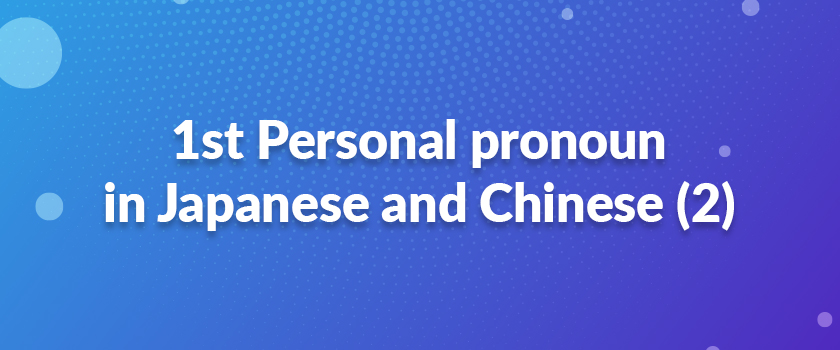In this article, let’s see some examples about 1st Personal pronoun in Japanese-Chinese translation.
そのさまが、本当にもう幼い童女のようで、私には悲しく思われた。
那样子真像个小女孩,我看了感到一阵悲哀。
In most of the cases, “し、わたしあたしく、あたし、おれ、ぼく” in Japanese is translated to “我”. That is because the word 我 is used by both male and female, unlike there is a sensible difference in Japanese according to the gender. Similarly, it is common to see that “わたちたち,われわれ,おれたち,あたしたち” in Japanese is translated to “我们”. Moreover, it is important to note that when we translate “おれ、ぼく” to Chinese, they are translated to “俺” from time to time. That is because the translator wants to keep the tone or emotion of the speaker. For example,
おれは、筒っぽうを着た男から、おれの革鞄を二つ引きたくって、のそのそあるき出した。
俺从穿筒袖的家伙那里,把俺的两个皮包一把夺了过来,慢条斯理地走开了。
Read Also: 1st personal pronoun in Japanese and Chinese (1)
In addition, there is no need to translate Japanese’s 1st Personal pronouns to Chinese. For example,
おかげで、どうやらスポンサァがつきましてね。どうにか私の仕事も出版してもらえそうになって来ました。そのお礼に伺ったのですが、逆にごちそうになっちゃいまして。
托您的福,好歹找到一位赞助者,出版也算是有了眉目。本来是来道谢的,结果反倒让你们招待……
実は、私は私で酒井さんにお目にかかって、一応出版のことをお断りしなければならないんです。まだ貴女にもお話ししておりませんが。
说实话,我要去拜见酒井先生,准备谢绝他赞助出书的好意。这话还没跟您讲……
So whether translate or not, we should make a sound analysis. Generally speaking, when 1st Personal pronouns are used twice in a conversation between two person, we should omit at least one avoid repetition.
Take a look at how we helped our client by localizing their project for Chinese language. Click here to read the complete case study



